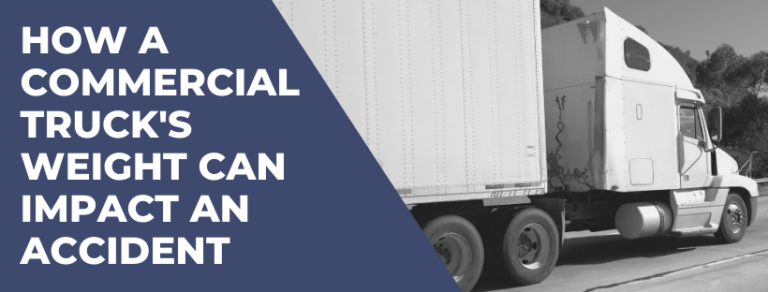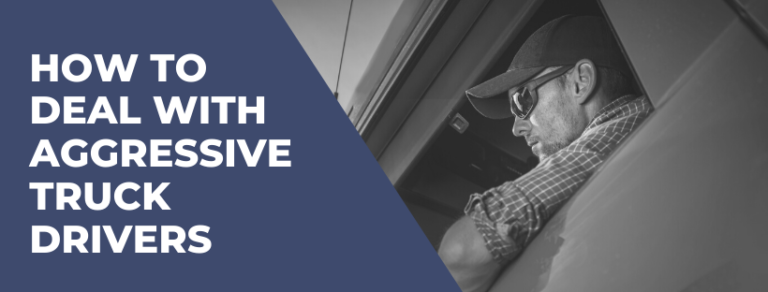Big rigs play an essential role in our economy, transporting everything from fresh food and the gadgets and gizmos we love to use daily to heavy machinery and hazardous materials for the industrial sector.
But they’re also incredibly dangerous. While any accident can cause severe, even life-threatening injuries — from car accidents and motorcycle collisions to accidents in the workplace — none are quite as potentially devastating as a truck accident.
But truck drivers aren’t the only person potentially responsible for an accident. Another party commonly at fault is the trucker’s employer — the truck company — through trucking company negligence.
In this blog, we look at how a truck company can be liable for an accident and the most common examples of trucking company negligence.
How Dangerous Are Trucking Accidents?
Despite projections that auto accident fatalities would decrease in 2022 — albeit only by 0.2% — it’s still estimated that 31,785 people died in roadway accidents in the first nine months of the year.
While we don’t have the data for truck accidents specifically, we know that commercial trucks were responsible for 4,842 fatalities and 106,902 injuries in 2020. Based on a similar projection for 2022 (and assuming fatalities continued on the same trend for the final few months of the year), we can calculate that semi-trucks cause roughly 11% of all fatalities.
That’s a shocking number, but do truck accident victims — whether individuals who sustain catastrophic injuries or those who have tragically lost a loved one — have any recourse for compensation?
Of course, the answer depends on a wide range of factors, but what it ultimately comes down to is:
Is another person or party responsible for the accidents (and can you prove it)?
It’s easy to assume that if you’re injured in a truck accident because a driver was fatigued or working over, the driver is responsible. But truck accident claims are complex and rarely as clear-cut. Often, the trucking company is also negligent, making them potentially liable for your injuries.
What Is Trucking Company Negligence?
Trucking company negligence is when a trucking company fails to ensure its trucks — and their drivers — are safe and properly operated on the road. Trucking company negligence can occur in many scenarios, from failing to train truckers or check qualifications to letting drivers stay on the road longer than they’re allowed by law. When trucking companies are negligent, and an accident occurs as a result, they may be partly at fault, even if a truck driver is majorly responsible for the crash.
Let’s look at some examples of trucking company negligence.
Common Examples of Trucking Company Negligence
Improper Hiring Processes
Negligence hiring is one of the most common examples of trucking company negligence. Commercial trucks can weigh as much as 80 thousand pounds when fully loaded and take over five-hundred feet to come to a complete stop, so driving a big rig is nothing like driving a family car, pick-up truck, or even a minivan. This makes trucks inherently more dangerous, and truck drivers are held to a much higher standard as a result.
To ensure truckers are appropriately qualified to handle their vehicle, South Carolina requires drivers to have a commercial driver’s license (CDL). To obtain a CDL, drivers must undergo rigorous training and skills tests to ensure they’re equipped to handle the potential dangers — such as a small car in their blind spot or a sharp turn that can cause a jackknifing accident. Even then, truckers must have the correct license for the class of truck they will drive. There are three truck classes: Class A, Class B, and Class C.
Trucking company negligence can come into play when a trucking company hires a trucker with the wrong class of CDL (or no CDL at all) or doesn’t conduct background checks. For example, a company may employ a driver for a Class A truck when they have a Class C license. Alternatively, they may hire a trucker with decades of experience and not dig into their background. It may be that a truck driver’s blood sugar levels are over 200 or their license was revoked two years ago because they were caught drunk driving.
Lack of Training
Truck drivers cannot simply pass their CDL and then be free to drive without additional training. That would be like a newly qualified surgeon jumping straight to practicing on people instead of researching, learning, and simulating the procedure on someone who isn’t alive. New laws are introduced, and new truck features are developed all the time — and it also never hurts to brush up on safety.
If trucking companies fail to train new drivers regularly — not just showing them how to use their driver log book as part of the onboarding process — and they cause a truck accident because of that lack of training, the trucking company may be responsible.
Failing to Maintain Trucks
Not maintaining trucks is another example of trucking company negligence. Truck companies are duty-bound to inspect and maintain their fleets. This includes getting trucks serviced by a professional mechanic, repairing or replacing known defects or worn parts, such as tires and brakes, and checking cargo is secure, balanced, and within the truck’s load limit before allowing their employee on the road.
A truck defect can cause a horrific accident — a tire blowout can result in a semi-truck skidding along the road at full speed into oncoming traffic, or a worn hitch can lead to the trailer separating from the truck’s cab.
If lack of maintenance causes your accident and you can prove the trucking company knew about a fault or risk and neglected to remedy it — or if the company intentionally pushed its trucks to the limit to avoid repair costs or trucks being stuck in the shop instead of out on the road — you may be able to recover compensation.
Violating Federal Regulations
It’s no secret that truckers work long hours, and this can result in drivers being fatigued and struggling to stay alert. Driving while fatigued is a top cause of truck accidents, but many can be avoided by abiding by federal rules.
These are set out in the Federal Motor Carrier Safety Administration’s (FMCSA) hours of service regulations, which state truck drivers must not be on the road for longer than 11 hours after a 10-hour break.
Unfortunately, drivers may disregard these rules, increasing the risk of an accident, and the trucking company can sometimes be responsible.
Truck drivers are required to record their hours in a log book to ensure they are only on duty as long as allowed. Truck drivers may log their hours incorrectly because they are pressured by their employer to work longer hours and meet deadlines. Truck companies may even incentivize drivers to work longer by offering bonuses for the most miles driven or deliveries made.
These are all examples of trucking company negligence.
A trucking company is also negligent if they spot a driver incorrectly logging their time and fail to address it.
If you’re injured in a truck accident, you may be entitled to significant compensation to cover your medical bills and lost wages and compensate you for your pain and suffering and the likely massive impact your injuries have had on your life.
If you suspect trucking company negligence played a part in your accident, your first step — after calling the police and seeing a doctor — should be to contact a truck accident lawyer in South Carolina.
Proving the trucking company is responsible is vital but can also be difficult. If a trucking company is negligent enough to contribute to a crash, a supervisor or the owner may not think twice about doctoring log books or hiding or destroying evidence to escape liability.
Our experienced personal injury lawyers in Greenville, SC, can tell you if you have a claim, protect your rights, gather evidence, and negotiate with the trucking company’s insurer to ensure you get the compensation you deserve.
Contact your local Greenville truck accident lawyers for a free, no-obligation case review.





